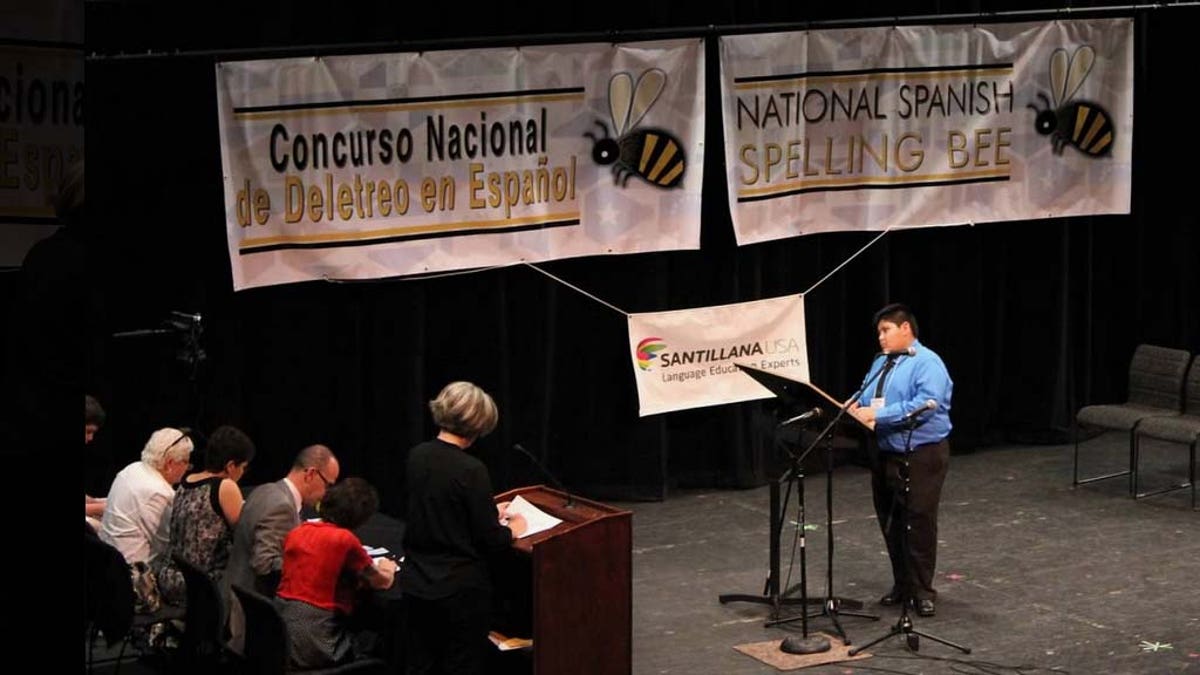
The 4th Annual National Spanish Spelling Bee in New Mexico. (New Mexico Association for Bilingual Education)
How do you spell success? At the mini-national spelling bee in Foxboro, Massachusetts, students spelled it en Español.
A growing number of schools, like the Foxborough Regional Charter School, are holding Spanish spelling bees, where students compete in much the same way as a traditional bee but they spell Spanish words (which can be translated for them into English if they need clarification) using the alphabet in Spanish, denoting a y as “y griega” or a v as “b corta,” for example.
“I believe you will be seeing more of these,” said David Briseño, executive director of the New Mexico Association for Bilingual Educators.
The association launched New Mexico’s state Spanish spelling bee in 1994. The spelling bee became so popular that the association began including other states into its fold. About eight states are participating in the regional contest and more are expected to be added.
But the phenomenon has taken hold throughout the country – with dozens of schools and districts throughout the country launching Spanish-launching spelling bees, not just for Hispanic students but for students from all types of background.
“It’s not just for Hispanics,” Briseño added. The first winner of New Mexico’s Spanish-language spelling bee was an undocumented Latina, but students from a wide variety of backgrounds now participate.
In Foxboro, Massachusetts, for example, there were only five native speakers of 130 contestants from surrounding states and the tri-state area and as far away as Colorado.
“It’s the same as with the Scripps (National) Spelling Bee,” explained Annie Azarloza, a world languages instructional leader from the Foxborough Regional Charter School, which hosted the event. “Just because you might be a native English speaker doesn’t mean you will be a great speller.”
Instead, she explained that while Spanish is phonetic and, theoretically, much easier to master the spelling of than English, accents, diérisis and silent h’s trip up the students.
Beth Coyne, a dean at The Country School in Madison, Connecticut, worried that her students would get creamed by native Spanish speakers in Foxborough. But she was surprised to find how many different backgrounds were represented.
“There were a couple of kids there where Spanish was their third language,” she marveled. Ultimately, she was happy her kids had the experience. “It elevated their level of engagement,” she said about how the competition made the students focus on the language, paying attention to different things.
Whether or not the students who competed in Foxborough ultimately win at the National Spanish Spelling Bee contest to be held in New Mexico from July 16 through 18, Azarloza said she views their participation as a success.
“When we embrace a language other than our own, we’re teaching our kids to be tolerant,” she said.
Districts who ultimately participate in the national contest vary widely from one another. Unlike Foxborough, Massachusetts and Madison, Connecticut, the Gadsen Independent School District in New Mexico is mostly populated by Spanish speakers. The district is nestled between the borders of Texas and Mexico and has been hosting a Spanish spelling bee for 35 years. Jose Reyes has been with the district as an instructor and coordinator for the event since it started over three decades ago.
“If you spoke Spanish when I was a boy, it was looked at as a second-class language,” Reyes explained. In his district now, that is not the case. Families show an interest in the bee because it is the language the parents speak.
“I think the kids get to experience the thrill of competition,” he said, “they get an understanding that their language matters, that Spanish matters.”
